As a business owner or operator of an SME, you’re at a juncture in your journey. You have already put in the work to establish and automate your business. As your business grows, the need to hire skilled Node.js developers becomes increasingly vital.
You may have heard about the importance of having a Node.js developer. But what exactly is Node.js, and how can it help scale your business effectively?
Node.js is not just another trendy term in tech; it’s a powerful platform tailored to modern business needs. Created by Ryan Dahl in 2009, Node.js is ideal for developing scalable network applications, particularly suited for businesses dealing with growth and surging online traffic.
A Node.js developer is a software engineer with expertise in developing web applications using Node.js, a widely adopted platform with over 6.3 million websites in the United States alone.
Node.js has grown tremendously for individual developers and companies over the past five years. Its asynchronous programming model allows Node.js applications to handle many users simultaneously very efficiently.
So, why should you, as a business owner, consider hiring a Node.js developer? Let’s explore the node js advantages and how it can help take your business to the next level.
Why Node.js is the Future of Web Development
Node.js revolutionizes application development with its event-driven, non-blocking model, ideal for handling data-heavy tasks across devices. It harnesses Google’s V8 JavaScript engine, allowing JavaScript code to run outside a web browser, opening up server-side programming.
Node.js has grown hugely popular for building other javascript servers and networking tools. Developers love how easy it is to write servers in JavaScript. According to a recent study, over a third (36.42%) of professional developers prefer Node.js for application development.
As more businesses use Node.js to create modern web and mobile backends, there is a high demand for skilled Node.js developers. Companies value Node.js because it lets them build powerful apps quickly using JavaScript.
Job sites consistently list Node.js as one of the most requested skills. Developers also enjoy working with Node.js due to its active community, numerous packages, and ease of use. As a result, Node.js experts are very sought after in the industry.
With apps growing more complex, the need for top Node.js talent shows no signs of slowing down. Many companies now prioritize hiring Node.js programmers to future-proof their technical stacks.
From Download to Javascript Code: Install Node.js in Minutes
The installation of Node.js is a breeze, and we’re here to guide you through it. Let’s jump straight into it:
Step 1: Download the Installer
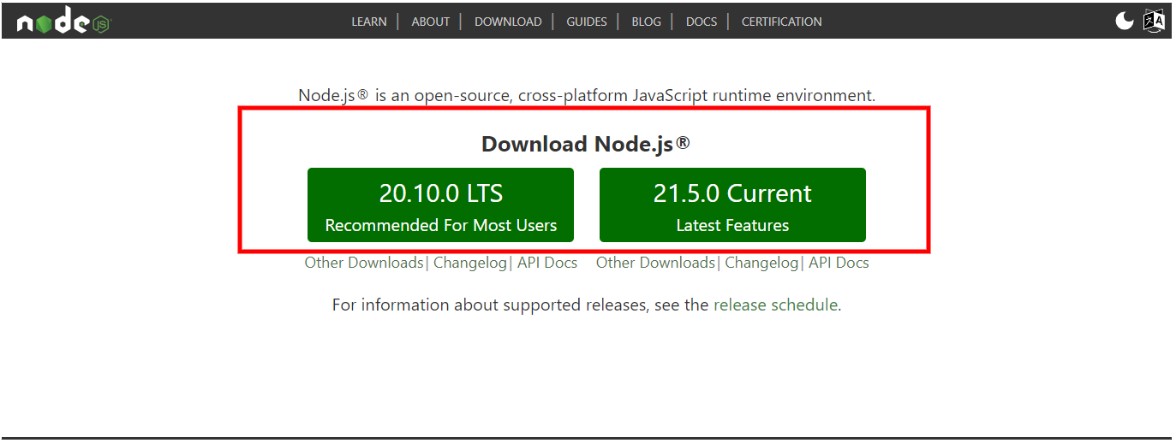
Get ready to dive into Node.js! But first, we need to grab the installer. Hop over to the official Node.js website.
You’ll find several download options, but choose the one that says ‘LTS’ (Long-Term Support) for now. This version offers the most stable and secure option for beginners. Depending on your operating system, select the appropriate download.
The file should begin downloading automatically, and you’ll be ready for the next step in no time.
Step 2: Install Node.js and NPM
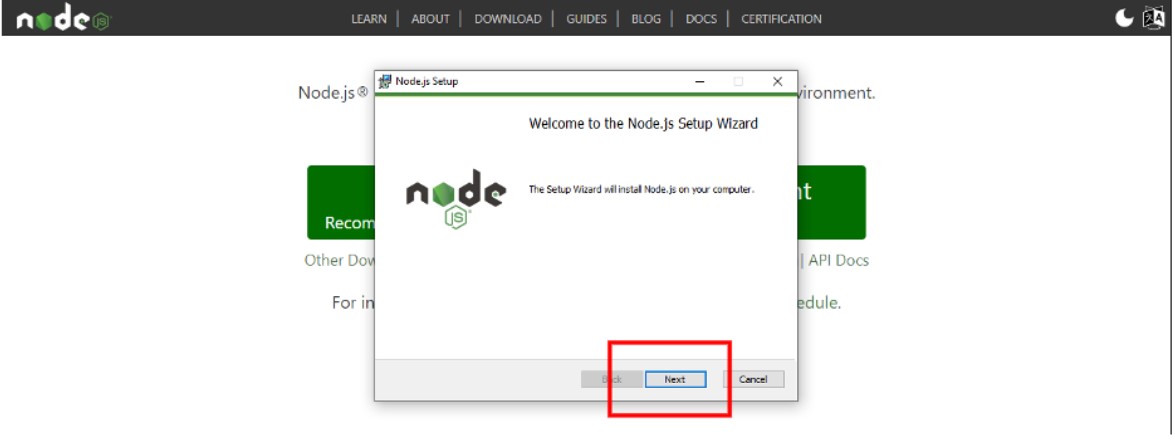
Once your download is complete, it’s time to install Node.js.
Open the installer file you just downloaded and follow the prompts.

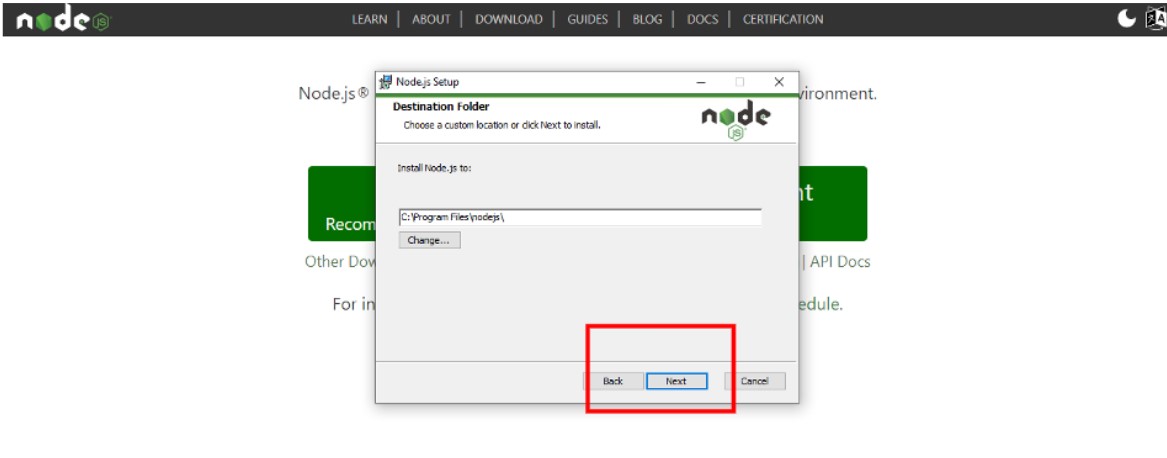
The installer will automatically install both Node.js and Node Package Manager (NPM), a useful tool for managing libraries and packages.
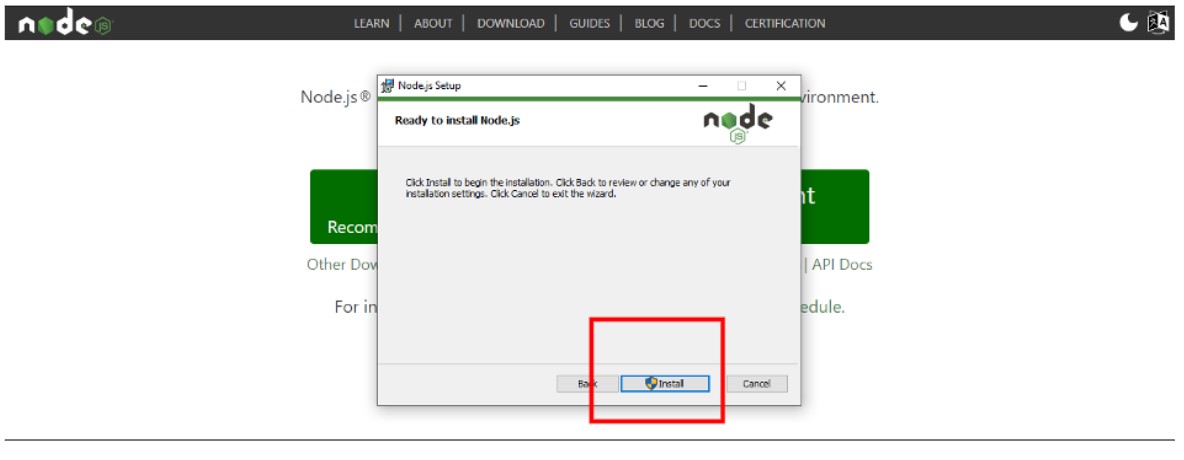
The process is quite straightforward, just a few clicks, and voila! You’ve got Node.js and NPM installed on your system.
On to the next step!
Step 3: Check Node.js and NPM Version
Now, let’s make sure everything is installed correctly.
- Open a new terminal window and type ‘node -v.’ This will display your installed version of Node.js.
- Then, type ‘npm -v’ to check your NPM version.
- If both commands return a version number, you’ve successfully installed Node.js and NPM.

You are now ready to start the exciting world of Node.js programming.
You won’t have to go far to hire a Node.js developer. CloudHire offers comprehensive Node.js consulting services for Node.js development. They guarantee top-notch service and help you get your project up and running. Schedule a demo today to explore our consulting services service!
Key Decision Points: Understanding Why Should You Use Node.js for Your Business Projects
If you’re a business owner in the field of web development or considering a web developer job, it’s crucial to explore Node.js. Here’s why Node.js is an essential tool for both business growth and web development and how it can enhance your operational efficiency, technical skills, and job prospects:

-
Tackling Real-Time Applications:
Node.js excels in real-time applications like chat tools, multiplayer games, and collaborative platforms. Its event-driven architecture efficiently handles incoming requests while worker threads manage simultaneous processes seamlessly.
Just imagine a chess game played globally. Each move triggers a key node event, processed without disrupting the ongoing game. Its application programming interface (API) takes a user action, say moving a knight, and instantly reflects it on all screens. This makes Node.js the ace up the sleeve of many development teams.
It’s all about ensuring a smooth, uninterrupted user experience. Node.js makes real-time seem easy!
-
Boosting Productivity with JavaScript:
Node.js unifies front-end and backend development with JavaScript, streamlining real-time tasks like managing customer orders, dynamic inventory, and instant feedback for improved productivity. It simplifies your codebase, reducing the potential for errors and streamlines development, boosting overall productivity.
-
Efficient Code Execution:
Node JS operates on Google’s V8 engine, which compiles JavaScript to machine code for faster execution. It efficiently manages multiple concurrent events in applications like chat using its event-driven architecture. The non-blocking I/O model ensures that your app remains fast and responsive, even under heavy load, improving user experience.
-
Solving I/O Bound Problems:
Node JS thrives in applications where extensive I/O operations are required, like video streaming platforms. It efficiently fetches data in small chunks. Node JS excels here with its asynchronous, non-blocking I/O operations, ensuring smooth playback without interruption. In such scenarios, it handles many requests simultaneously without bogging down the system, offering a seamless viewing experience to your users.
-
Accessing Code Libraries:
Node JS offers access to an extensive ecosystem of open-source libraries through npm (Node Package Manager). For instance, when building a weather app, you can easily integrate ‘weather-js,’ saving development time by leveraging pre-packaged, reusable code.
To take full advantage of this, consider enlisting professional help. If you’re looking to hire Node JS programmers to enhance your business, Cloudhire offers you the chance to connect with skilled developers ready to bring your project to life.
Node.js Advantages: Why use Node.js for Developing Web Apps
There are several key reasons why business owners should consider using Node.js for their applications and websites. Node JS advantages include:
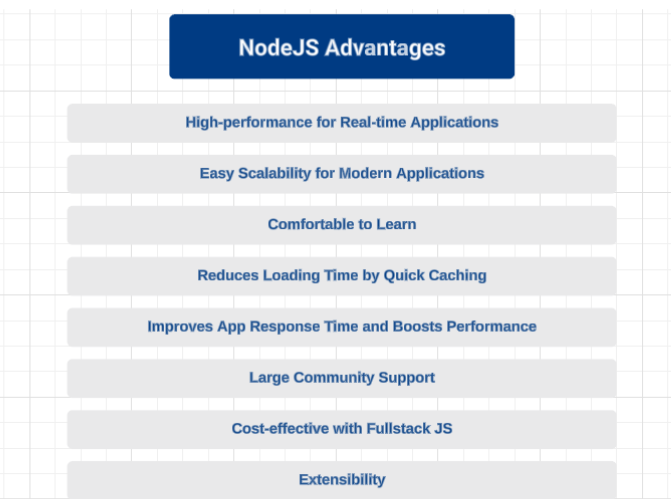
-
High-performance for Real-time Applications
Node JS has been nothing short of a game-changer in real-time applications. Why? Because it uses an event-driven, non-blocking I/O model.
This asynchronous programming model allows for high throughput and efficient use of resources, even when handling multiple concurrent requests. This is particularly useful for real-time gaming, chat applications, and live updates requiring consistent, instantaneous responses.
In the traditional synchronous model, each request blocks the following until it’s fully processed. But with Node JS, the event loop allows the system to continue receiving and responding to other requests while the current one is being handled. This event loop also eliminates bottlenecks, making your app fast and lightning-fast.
Additionally, Node JS uses the V8 JavaScript engine, which compiles JavaScript code into machine code. This makes execution exceedingly quick as it eliminates the interpretation step commonly required for javascript code or by other programming languages.
CloudHire connects you with Node.js experts specializing in optimizing real-time applications, ensuring your business effectively leverages this high performance.
-
Easy Scalability for Modern Applications
One of the notable strengths of Node JS in web app development is its easy scalability. With its powerful runtime environment, Node JS allows developers to scale web applications vertically and horizontally.
Vertical scaling means adding more resources to your existing machines, like enhancing the CPU or RAM. Node JS can effectively use multiple CPU cores, a unique feature among JavaScript frameworks, to increase application performance.
On the other hand, horizontal scaling involves adding more machines or systems to your server pool. This is where Node JS truly shines. You can seamlessly add more nodes to your existing system, and Node JS can manage load balancing effectively. This makes Node JS ideal for data-intensive and real-time web applications that need to perform at scale.
With CloudHire, find developers who excel in scaling applications using Node.js, helping your business grow seamlessly in today’s dynamic market. So, whether you’re starting small or already serving a global audience, Node JS offers a flexible and high-performing web development solution that scales with your business.
-
Comfortable to Learn
One of the top advantages of Node JS is that it’s incredibly easy to learn, especially if you’re already familiar with JavaScript.
Unlike other languages that require learning a whole new syntax, Node JS allows you to leverage your existing JavaScript knowledge, as it is not a framework but an open-source runtime environment. This significantly reduces the learning curve for new developers and allows seasoned JavaScript coders to transition smoothly into server-side programming.
Plus, the widespread adoption of Node JS in the web development community means a wealth of resources, tutorials, and support is available. Another great tool that simplifies learning is the Node Package Manager (NPM). This vast library of reusable code packages can be easily integrated into your projects, reducing the need for time-consuming and complex coding.
Also, Node JS includes built-in support for package management and the ability to run a web server without external software. This mix of ease and versatility makes Node JS an attractive choice for both budding and experienced developers.
Our Node.js developers at CloudHire, with their profound understanding of JavaScript, make the integration and development process smoother and more efficient for your team.
-
Reduces Loading Time by Quick Caching
One of the standout advantages of Node JS is its ability to significantly reduce loading time through a process known as quick caching. This feature provides an impressive speed boost to your web applications, making them more responsive and efficient.
Here’s how it works: During the first request to the server, the modules are automatically cached in the application memory.
Node JS quickly pulls the cached data for subsequent requests instead of re-executing the codes. This ability slashes loading times and decreases the strain on your server, improving overall performance.
The quick caching feature is particularly beneficial for CPU-intensive tasks and common programming tasks like object-relational mapping and operations. It’s an aspect of Node JS that helps to streamline project development, keeping your web application humming along nicely.
So, the next time your web app feels a little sluggish, remember Node JS and the power of quick caching!
-
Improves App Response Time and Boosts Performance
One of the most significant advantages of Node JS is its impressive capacity to enhance response times and overall performance.
Its ability to perform non-blocking I/O operations, coupled with its single-threaded, event-driven for-loop model, enables it to manage multiple requests simultaneously. This makes it particularly effective for handling CPU-bound tasks, such as image or video processing, as well as other CPU-intensive tasks.
Node JS shines in scenarios that require real-time web application development, like gaming or chat applications. The icing on the cake? Node JS also excels in managing database operations, particularly those involving data streams or JSON format. This essentially results in quicker, more efficient data retrieval, giving a boost to your application’s performance.
When PayPal adopted Node.js, it led to a significant decrease in their response times. On average, pages were served 35% faster – a reduction of 200ms. These minor speed improvements add up to a better user experience for a major company with high traffic volumes.
-
Large Community Support
One of the great advantages of Node JS is its large and active community support. This vibrant group of JavaScript programmers consistently adds new modules and packages to the Node JS library support system. These additions significantly enhance the functionality of Node JS and speed up project development.
The vast repository of open-source libraries available to developers can tackle almost any common programming task. This community also provides an impressive support network for troubleshooting and problem-solving. Moreover, the widespread use of Node JS means that most questions you may have are likely already answered on popular coding forums.
With the power of a passionate and experienced community behind you, Node JS proves an invaluable asset in web application development. It’s a game-changer, especially for small to medium-sized enterprises looking to scale up their web pages and operations.
It’s like having a dedicated team of experts, just a click away, ready to lend a hand and share their knowledge. That’s the advantage of a thriving community – constantly evolving, supporting, and pushing the boundaries of what’s possible with Node JS.
-
Cost-effective with Fullstack JS
One of the stellar node js advantages is its cost-effectiveness. You can eliminate the need for two resource teams by utilizing Node JS for your project development.
Traditionally, separate teams are needed for server-side and client-side programming languages, which can drain your resources. But, with Node JS, you need only one team proficient in JavaScript to handle both server-side and client-side code writing.
This consolidation reduces the cost of Software Development and leads to faster, more efficient development cycles. Node JS is an open-source platform, so you don’t have to spend a dime on licensing fees.
So, you’re saving money while accessing a robust, high-performance development platform. In the long run, this cost-effectiveness can be a significant factor in boosting your return on investment. It’s a win-win situation!
-
Extensibility
One of the most captivating aspects of Node JS is its extensibility. This feature transforms the platform from a standard server-side JavaScript runtime to a developer’s sandbox playground, giving the freedom to customize it as they see fit.
Node JS can be extended with add-ons, modules, and packages, which allows developers to get creative and innovative in their coding approach. This flexibility opens doors to tailored solutions for complex coding problems that standard programming languages may struggle to solve.
For instance, take XML parsing, which could be tedious in other languages. In Node JS, with the help of npm packages, you can readily parse XML without writing much boilerplate code. This expedites project development and makes Node JS an attractive choice for backend development.
Not to forget, Node JS’s extensibility makes it a cross-platform environment. You can develop Windows, Linux, or Mac apps without changing your codebase. This makes it a versatile player in the tech field and an efficient one.
Ready to elevate your business with expert Node.js developers? Discover the ideal talent with CloudHire. Schedule your free consultation today and take the first step towards scalable success.
Disadvantages of Node.js: What is Node.js Not Good For

Node.js has become one of the most popular programming languages, especially for cross-platform applications and server-side code. It is notably potent for developing real-time web pages due to its event-driven and single-threaded nature. However, despite its accolades, Node.js is not without its disadvantages. Disadvantages of Node.js include:
- Unstable API: Developers often find maintaining compatibility with the latest versions challenging. Node.js is infamous for frequently altering their APIs, meaning developers must constantly rework their access code to stay current. This instability can be time-consuming and frustrating for development teams.
- Lack of Library Support: Node.js lags behind when it comes to a strong library support system. It pales compared to other languages, offering extensive libraries for tasks such as XML parsing, image processing, and database operations.
- Asynchronous Programming Model: Node.js primarily relies on an asynchronous programming model. While this is ideal for handling a multitude of incoming requests and key node events, it makes the code more complex and difficult to trace. This increases the chances of bugs and errors creeping into the system.
- Callback Hell Issues: Given its single-threaded nature, Node.js is notorious for its ‘callback hell’ issues. These intricate, nested callbacks can make code nearly impossible to read or debug. As the adage goes, “No tool is good or bad, but thinking makes it so.” This issue can slow down your development team and complicate your overall project development, highlighting one of the significant disadvantages of node.js.
While Node.js’s API changes can be challenging, CloudHire’s Node.js experts stay abreast of the latest developments, ensuring your project is always on the cutting edge without the hassle.
Hire Node JS Developers with CloudHire
Navigating the tech hiring world can be complex, particularly for specialized roles such as Node.js developers. That’s where CloudHire comes into play.
We understand that you want to hire Node js developers who can help you scale up your business. To assist in this endeavor, CloudHire offers a platform that enables you to hire top-notch remote Node.js developers with ease.
Moreover, CloudHire is not just about helping you hire Node.js developers; we also care about successfully integrating these developers into your team. Ensure smooth integration of your new Node.js talent with our comprehensive developer onboarding checklist, setting the stage for immediate productivity and teamwork.
Finding the right Node.js developer for your business has never been easier. With CloudHire, you can ensure the right skills, seamless integration, and productive collaboration. Why wait? Book a demo with CloudHire today and find the best solution for your next hire.
Frequently Asked Questions
What makes Node.js a single-threaded language?
Node.js operates on a single thread, using non-blocking I/O calls and an event loop to handle multiple concurrent clients, making it highly efficient for web app development.
What is NPM?
NPM, or Node Package Manager, is the default package manager for Node.js. It’s a repository for Node.js packages and modules, simplifying installation, updating, and use.
Explain the event loop in Node.js.
The event loop in Node.js handles all asynchronous callbacks in the application. It’s a crucial part of Node.js architecture, allowing it to take high loads with low latency and high throughput.
Why is NodeJS useful?
NodeJS is excellent for developing HTTP web servers and networking tools using JavaScript, one of the most programming languages. It’s scalable, efficient, and perfect for real-time applications.
What is NodeJS best used for?
NodeJS shines in developing real-time applications, single-page applications, data streaming applications, APIs, and when scalability matters. It’s also great for server-side programming.
Why is NodeJS better than Python?
While both are powerful languages, NodeJS might outshine Python in web app development due to its event loop and non-blocking I/O handling.











